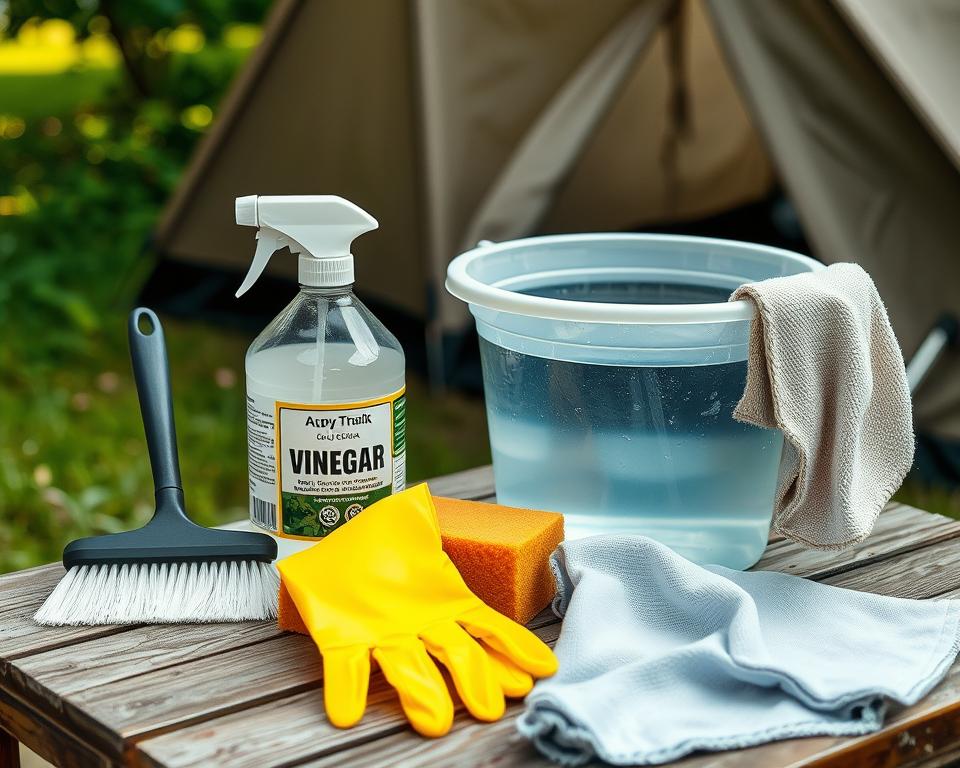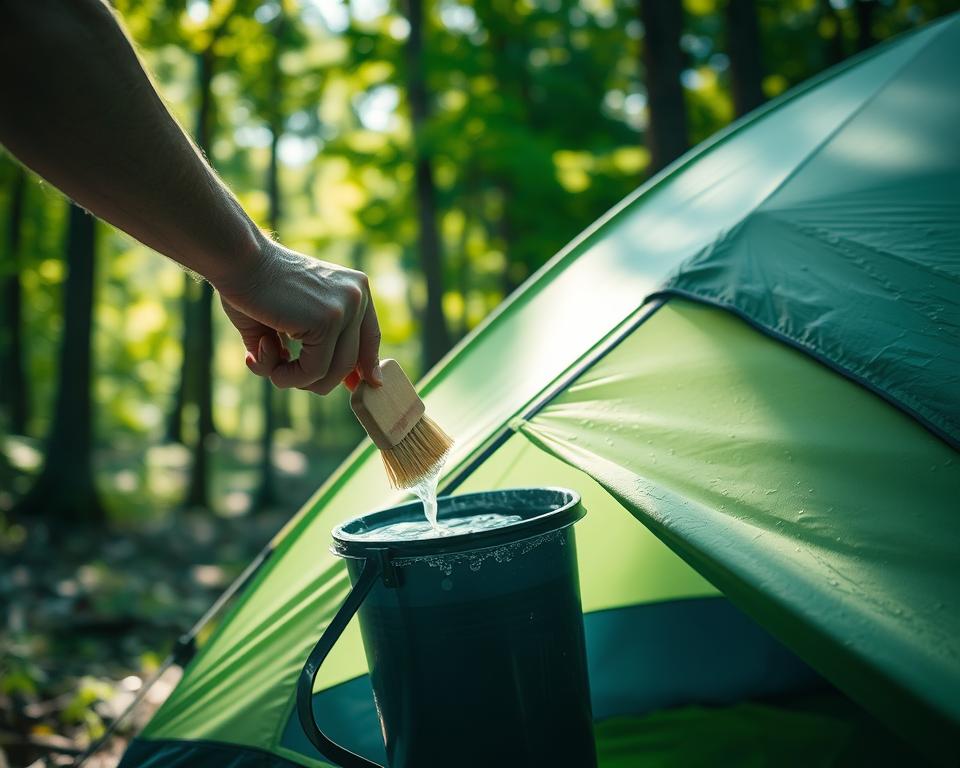If you’re an avid camper, you’ve probably dealt with moldy tents. This is a big issue for tent care. Mold grows in dark, damp, and warm spots. Tents are perfect for this, especially if stored wet. Not dealing with mold can cause health issues. This includes breathing problems, skin trouble, and allergies. As a camping and gear cleaning fan, I want to share a simple guide to solve this problem.
Mold can be black, blue, red, or green. White or pale yellow usually means mildew. To clean mold, use diluted vinegar, a mix of baking soda and water, or lemon juice. Stay away from bleach to avoid damaging the tent. Keeping the tent well-ventilated and storing it in a cotton bag, not plastic, can stop mold from coming back.
Understanding the Causes of Mold in Tents
Mold is a common issue for camp lovers, especially when it finds its way into tents. Knowing why mold grows in tents helps keep your gear in great shape. Mold loves moist, dark, and warm places. Your tent can become a home for mold if it stays wet for too long, gets condensation inside, or is stored damp.
CanvasCamp tents are made with 100% cotton canvas and are treated to resist water and mold. But even with these treatments, they can still get mold without the right care and storage. Mold can start growing in just 24 hours under the right conditions. So, keeping your tent well-ventilated and dry is very important.
Here’s how to keep mold away:
- Always air out your tent well after it gets wet from rain before you pack it up. This step helps get rid of moisture that mold loves.
- Don’t set up your tent in damp, shaded places. These areas, especially if humid, are perfect for mold.
- Check your tent often for mold, which can look like little black, blue, or green dots. Clean it as soon as you see these signs to avoid damage.
- Make sure your tent is fully dry before you pack and store it. Keeping it in a dry place is key to stopping mold.
Plastic tents might be easy to care for, but they don’t breathe like canvas tents. This can make them trap moisture more easily. That’s why good air flow is key for any tent.
Mold is a fungus that breaks down organic material to grow, and can seriously damage your tent. It can lead to decay, holes, tears, and might even ruin your tent completely. By taking steps to prevent mold, you can keep your tent in use for a long time without mold problems.
Is It Safe to Sleep in a Moldy Tent?
Sleeping in a moldy tent is risky for your health. It can cause mild to severe health problems. For example, you might start sneezing, feel tired, or get headaches.
People with asthma or weak immune systems should be extra careful. Black mold exposure is even more dangerous. It’s important to clean your tent of mold before going camping.
Mold doesn’t just harm your health. It can damage your tent and stuff inside, like sleeping bags. Foods stored in a moldy tent can become unsafe too.
Sometimes, you might have to sleep in a moldy tent during emergencies. But, try to avoid it because of the health risks. Keep your tent dry and clean, and air it out well to avoid mold.
Making sure your camping trip is safe means watching out for mold. Check your gear for mold before heading out. This keeps your equipment and health safe.
Necessary Supplies for Cleaning Mold from Your Tent
To clean a tent with mold, you need the right supplies and patience. You will need various tools and cleaning products. Here are the key things you should have ready.

Cleaning Tools
Choosing the right tools is crucial for mold removal. A soft-bristle brush or sponge works best for scrubbing. It won’t damage the tent fabric. Make sure to wear gloves to protect your skin from mold. If the infestation is bad, wear eye protection and an N95 mask too.
Cleaning Solutions
Eco-friendly solutions are best for cleaning mold. Use mild detergent or soap with water for light mold. For tough mold, mix white vinegar with water or use hydrogen peroxide. A mix of salt, lemon, and hot water also works well. Always do a spot test first. Rinse well after cleaning to remove any leftovers.
How to clean a moldy tent: Step-by-Step Instructions
Cleaning your tent from mold is key to keeping it in good shape. By removing mold step-by-step, you can stop it from coming back. Here’s how to do a thorough cleaning.
Initial Scrubbing
Begin by gently scrubbing away the mold. Use a soft brush or sponge. Getting rid of loose mold first makes the next steps easier. Remember to wear gloves and a mask to protect yourself.
Applying the Cleaning Solution
Now, mix a cleaning solution. For tough mold, mix 1 part bleach with 10 parts water. Or use vinegar and water for a natural option. Cover the mold spots with the solution. Let it sit for 15-20 minutes to kill the mold.
Rinsing and Drying
Next, rinse the tent well with water. This gets rid of bleach or vinegar leftovers. Make sure the tent is totally dry before you pack it up. Drying it in the sunshine is best. It helps kill any leftover mold spores.
Follow these steps to clean your tent and keep it mold-free. Regular care and making sure your tent is dry will prevent mold growth.
What Should I Consider When Cleaning a Moldy Tent to Prepare for Safe Waste Disposal While Camping?
When cleaning a moldy tent, focus on safety first. Use protective gear and work outdoors to avoid inhaling spores. Consider eco-friendly cleaning solutions as part of your cleaning process. Finally, consult waste disposal tips to ensure you manage any contaminated materials responsibly and minimize environmental impact while camping.
Preventing Mold Growth in Your Tent
Keeping your tent mold-free is key to enjoying the outdoors. I’ll share tips on preventing mold, storing your tent, and caring for your gear. Learn how to make your tent last by keeping it mold-free.
Proper Storage Tips
Storing your tent right is important for stopping mold. Make sure it’s totally dry before you pack it up. Drying can take 6-8 hours, so plan ahead. Use a breathable cotton canvas bag for storage.
Also, keep your tent in a cool, dry spot. This helps stop mold from growing.
Regular Maintenance
Keeping your tent clean is crucial. Clean it well after each use, especially when exposed to sand or dust. Use a soft brush, mild soap, and hot water for the canvas. Seal the fabric to keep moisture out.
Don’t forget to clean the floor and take care of muddy lines. This keeps dirt off the ceiling and stops mud splatters.
Ventilation Tips
Good air flow helps prevent mold. Set up your tent to reduce condensation. I recommend opening windows and doors to air it out sometimes.
Avoid placing your tent near trees, as it can bring moisture. Also, use a ground tarp to cut down on condensation and protect the floor.

